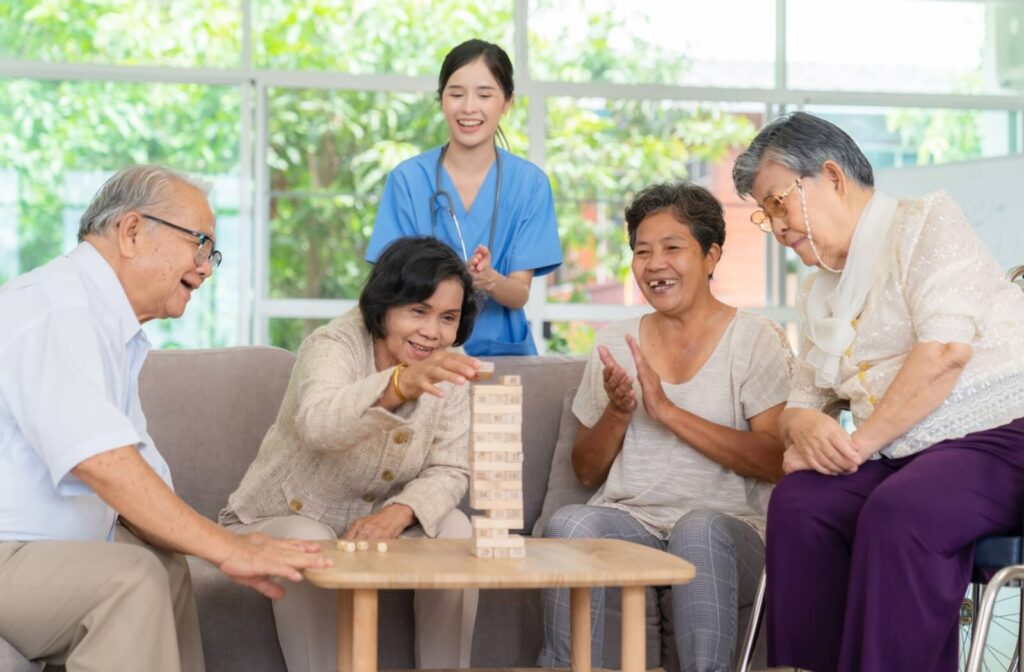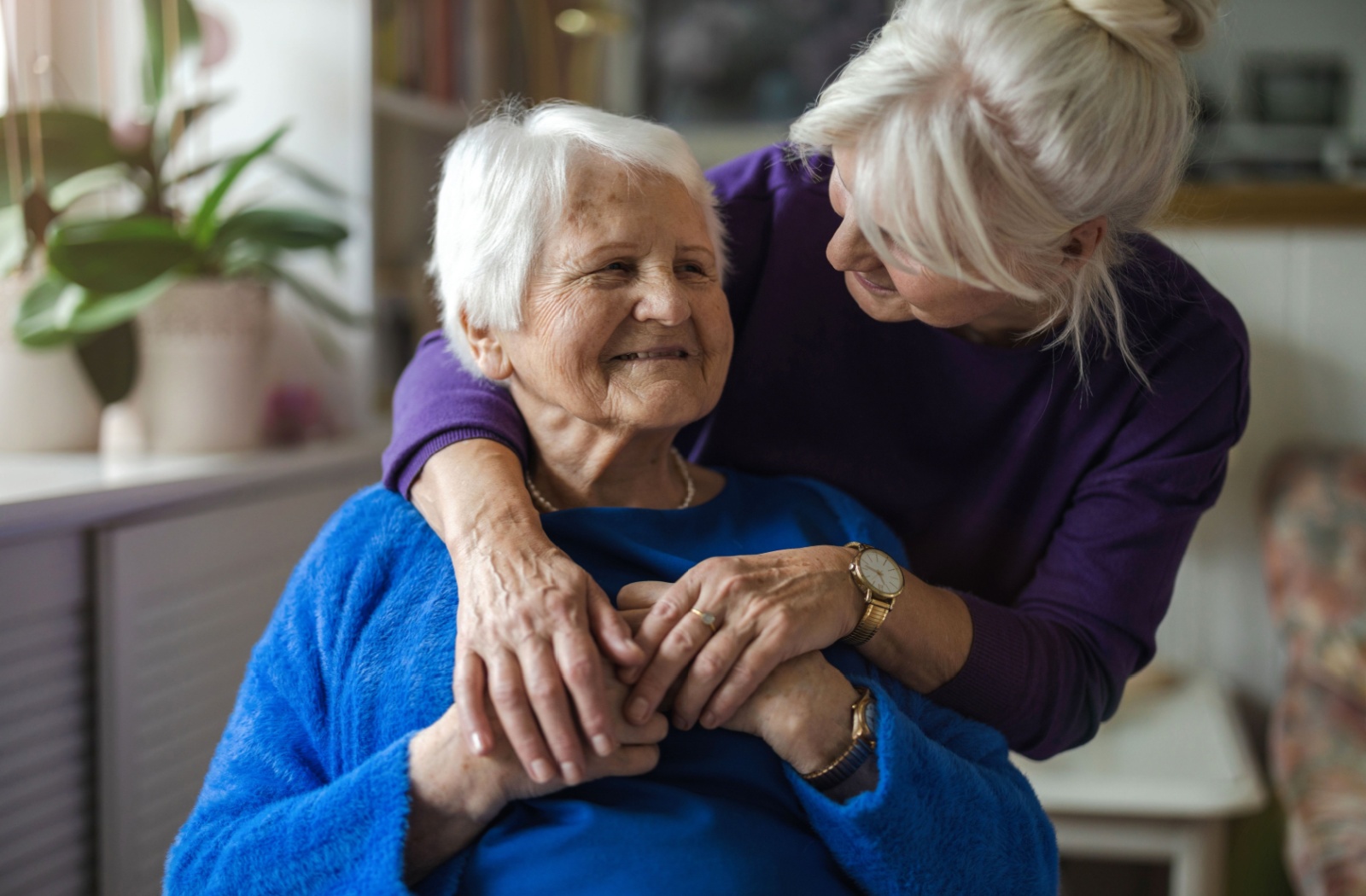When a loved one is living with memory loss, it can bring up many questions for your family. Navigating this journey often means looking for a new kind of support, and understanding your options is a helpful first step.
Memory care communities support families by providing a secure, compassionate environment for your loved one, which in turn offers you peace of mind and time to recharge. They become a partner in care, helping everyone involved navigate the changes that come with memory loss.
Key Takeaways
- Memory care is a specialized form of senior living created to support those with memory loss.
- Care teams respond to behavior changes with compassion, understanding them as a form of communication.
- Daily routines and engaging activities are designed to promote overall well-being and a sense of calm.
- Communities support families through the transition process and encourage them to stay connected.
- Family caregivers find relief and support, allowing them to focus on their relationship with their loved one.
What Is A Memory Care Community?
A memory care community is a specialized type of senior living designed to support individuals with cognitive changes like dementia or Alzheimer’s. The entire environment is structured to help residents feel safe and purposeful. These communities provide personalized support that nurtures independence while offering a helping hand.
What is the Difference Between Memory Care and Assisted Living?
While both memory care and assisted living offer support, memory care provides a more focused approach for those with cognitive changes. This includes specialized programs designed to engage residents and stimulate memories. Team members also receive specific training to provide compassionate and effective dementia care.
Memory care communities are thoughtfully designed to create a setting that is both comforting and secure. This often includes features like secured outdoor spaces for enjoying fresh air safely. You may also find circular hallways that allow for safe wandering without encountering frustrating dead ends.
Understanding & Responding To Behavior Changes
Changes in personality and behavior can be one of the more challenging aspects of dementia for families. Memory care communities offer support by understanding the reasons behind these changes, which are often related to the symptoms of Alzheimer’s. Teams are trained to respond with patience and compassion, not frustration.
How is Behavior A Form Of Communication?
Often, a change in behavior is a way for your loved one to communicate a need they can no longer express with words. Care teams work to identify triggers and understand what your family member might be trying to express. They focus on:
- Looking for patterns in behavior
- Considering potential medical issues like pain or discomfort
- Responding to the emotion, not just the action
- Finding compassionate ways to redirect or soothe
How Helpful Routines & Structure Help Memory Care Residents
A predictable daily routine can be very comforting for someone with memory loss. A structured yet flexible schedule helps reduce agitation and confusion. This creates a sense of purpose and normalcy throughout the day.
What Are Some Tips For Better Communication?
As communication becomes more difficult, care teams use specific strategies to connect with residents. These are simple techniques you can also use to create more positive interactions. They include:
- Speak slowly and calmly.
- Use simple, one-step directions.
- Listen for the feelings behind the words.
- Use nonverbal cues like a reassuring touch.
Promoting Well-Being Through Daily Life & Activities
A key way memory care supports residents is by focusing on their overall well-being. This involves creating opportunities for physical activity, social connection, and restful sleep through a full calendar of engaging activities. These elements can positively impact mood and behavior.
What Are The Benefits Of Physical Activity?
The health benefits of physical activity are well-documented, as regular movement can improve sleep, boost mood, and help maintain strength and balance. Memory care programs incorporate gentle exercise into the daily routine. This could include guided walks, stretching, or chair yoga.
How Do Memory Care Teams Manage Sleep?
Difficulties with sleep and increased confusion in the late afternoon are common. Memory care teams help manage this by creating a calm and predictable rhythm for each day. They help by:
- Encouraging daytime activity and exposure to natural light.
- Creating a calm, quiet environment in the evening.
- Maintaining a consistent bedtime routine.
- Offering soothing activities before bed.

The Transition To Senior Living & Staying Connected
The decision to move to a memory care community is a significant one, and we offer guidance on how to ease the transition for everyone involved. It is a journey for the whole family. These communities offer resources to help make the process smoother and encourage continued family involvement.
Preparing For Moving Day
Making a new space feel like home is important for helping your loved one adjust. You can help by personalizing their new room with familiar and comforting items. Consider bringing some of these things from home:
- A favorite chair or quilt
- Family photos and meaningful keepsakes
- Familiar music or books
- Their favorite scented lotion or soap
How Often Should You Visit Your Loved One?
There is no single answer for how often to visit—it depends on your family’s unique situation. The goal is to make visits a positive experience for both you and your loved one. Shorter, more frequent visits are often more successful than long, infrequent ones.
Finding Support For Yourself & Your Family
Caring for a person with dementia affects the entire family. Memory care communities recognize this and often become a resource not just for the resident. They are there to support family members as well.
The Importance Of Taking Breaks
When your loved one is being cared for by a dedicated team, it gives you an opportunity to rest and recharge. Taking time for yourself is a necessary part of being a supportive family caregiver and can help prevent caregiver burnout. For families who need a shorter-term solution, respite care options can also provide that much-needed break.
Finding A Caregiver Support Group
Many senior living communities can connect families with local support groups. These groups provide a safe space to share experiences with others who understand. Hearing from others in similar situations can help reduce feelings of isolation.
Choosing a memory care community is about finding a supportive partner for your family’s journey. At The McKendree, we help residents live with purpose in a caring and secure environment. This support extends to families, offering relief and the comfort of knowing your loved one is in a warm, welcoming place.
We invite you to learn more about our approach to memory care. Contact us today to schedule a tour and see our community for yourself.


